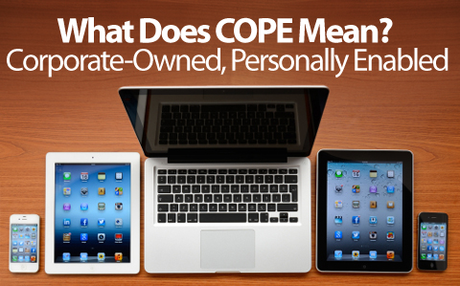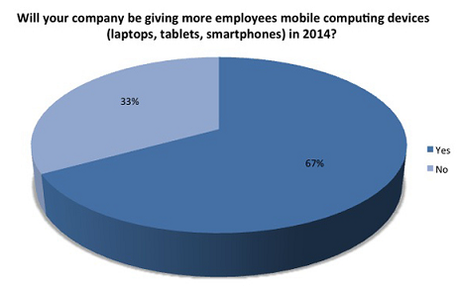It needs immense improvisations for businesses to cope up with the ongoing trends in the field of enterprise mobility management. Simultaneously, they run the obligation to keep a regular check on their own financial constraints and security measures as well. One aspect that is worthy of reconsideration in this regard is the BYOD trend. Technology experts believe that more than infusing a revolution in the enterprise mobility world, BYOD has led to the inception of a hoard of problems related to security, data recovery, etc. Furthermore, employees often use incompatible devices and apps that may further give rise to collaboration issues and overdue expenditures. This is where the corporate owned, personally enabled (COPE) strategy has started doing rounds in the corporate domains.

Sacatech
What is COPE?
It is a model that lies somewhere between the traditional corporate-led deployments and the BYOD model, and gives IT control back to the employer. Organizations abiding by this tactics purchase hardware or computing resources and provide them to their workforce for use within the company. This helps the employers to retain complete ownership of devices and gain better control of activities being performed on those devices.
How COPE is better than BYOD?
Comparison between the two different IT strategies could be summed up in the points below:
Cost: To start with, the corporate owned personally enabled strategy can prove to be comparably less expensive than BYOD. Buying devices in bulk could be cost-effective and in addition, it also saves the employers from reimbursing the cost of their workers’ mobile devices and the involved rate plans, either in parts or in full.
Security: BYOD trend is likely to add weight to security threats since most of the personal devices do not follow apt security measures. This could lead to confidential corporate data being compromised. With COPE, companies get complete hold of the device, they can implement upscale monitoring, and policing methods to safeguard the devices. In case of theft of COPE device, owners can completely delete the data to avoid its misuse. However, this practice is illegal if the device is owned by someone else (mostly in European countries).
Freedom: Employees get the choice to use corporate owned device as per their wish. They can install new apps, access social networking website, shoot personal emails, etc. However, workers should take care not to use the COPE device wrongfully.
Facts and stats
During the starting days of BYOD, it was expected to bring about a sensational revolution in the IT industry. Even nowadays, it is a vibrantly accepted trend by most of the organizations as is obvious from certain survey reports. According to Gartner, 70% of mobile users are expected to use their personal devices for professional work. Likewise, IDC postulates the use of 65% of an estimated 480 million smartphone for BYOD program by 2016.
These reports sound good enough for BYOD admirers. However, considering its role in untapped access to corporate data by end users, the trend is not expected to last for long. It compels the companies to invest significantly in meeting the three main operational challenges, including security, governance & compliance and mobile device management (MDM).
The January 2014 Gartner report entitled “Predicts 2014: Mobile and Wireless”, also discloses very much identical results as it states that 1 out of every 5 (i.e., 20%) BYOD programs would succumb due to preventive MDM solutions of the respective IT departments.
Furthermore, Forrester’s latest State of Enterprise Mobile Security report published in March 2014 also reveals that near about three-fourth (74%) employers have plans to buy or have already bought mobile devices for their workforce, thus trying to ensure more data security under COPE and parting ways with BYOD.

The annual TechTarget/Computer Weekly IT priorities survey report by Computer Weekly in Jan 2014 discovers that 37% of the IT leaders surveyed have plans to implement a mobility strategy for their enterprise in the current year. The report also states that 67% of the organizations are willing to switch over to corporate-owned, personally-enabled (COPE) model, based on their business requirements.
To summarize, COPE, though not a perfect solution to the security and cost issues arising with organizations, is still a suitable alternate to BYOD. While it helps companies save reimbursing expenditures for devices under BYOD program, buying hardware in bulk also proves cost-effective. As for security, companies need to implement apt security measures, yet not intruding into the privacy of employees, to make COPE a success in the enterprise mobility domain. In the wake of these facts, it can well be inferred that COPE is all set to overshadow BYOD strategy in the near future.
Finoit is an enthusiastic employer that provides a comfortable working environment for its creative workforce. We extend full freedom to our team members to grow exceptionally in their respective technical niche. This is perhaps one of the reasons why we are among the leading mobile, web and desktop application developers.
To know more about our IT services or to avail our assistance for any of your Android, iOS, Windows Phone development endeavors, feel free to approach us at the earnest.
How WebRTC is better than Closed Online Communication Tools for Enterprises?Why Phablet Market Could Anticipate Bright Future?